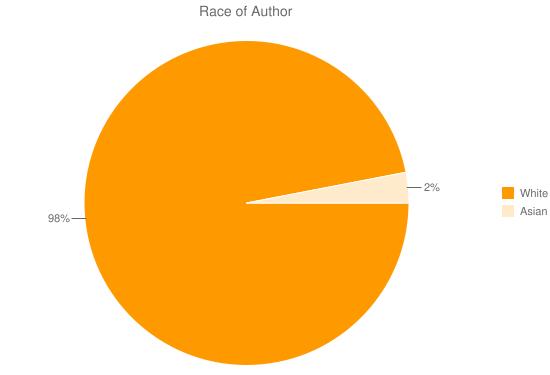
Everything is Nice has some nice, juicy posts up analysing the eligible submissions for the 2011 Clarke Award. The Clarke Award is awarded annually for the best science fiction (or fantasy) novel published in the UK the previous year. It doesn’t have a long list but a short list is selected from all submitted novels; those submissions cover roughly 90-95 percent or so of new sf&f novels being published in the UK each year. Some works of course always slip through the crack, especially from non-sf publishers who don’t know or care about the awards. The Clarke Award submissions list than is a good, but not perfect indicator of the state of the UK’s sf publishing industry and as such Martin Lewis has analysed them, which resulted in e.g. the figure above.
In other words: sf publishing is only marginally less white than the group of writers the BBC thinks represents the future of British literary fiction. And worse, it has a much bigger gender imbalance: only 17 percent of the 54 novels submitted this year were written by women. Martin also looks at other identity markers (sexuality, nationality) and it all points to the conclusion that it’s largely straight, white British or American men that were published last year. (The raw data for all this can be found at Torque Control. )
The questions this inevitably puts to mind are a) is this analysis reliable when applied to the general state of the UK’s sf&f publishing industry as opposed to just the Clarke Award submissions b) is this a bad thing (imo: yes) and c) what can we do about it?
Assuming the answer to a) and b) are both yes, the question what we readers can do to change this situation is a difficult one to answer. You can only buy what’s being published after all and if only two books out of fifty-plus are by people of colour, how big an impact will it have when enough people buy their books? It’s easier to send a signal by boycotting a given company’s products, not so easy to express a preference through your buying habits. More projects and media attention to under represented people in science fiction as with the various “women sf writers” reading projects started this year would be a start, but are only suited to provide attention to this problem, not solve it. Suggestions?
